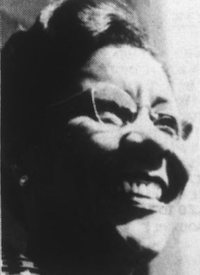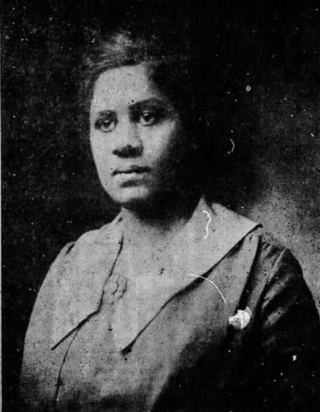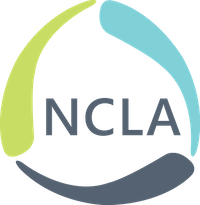Related Research Articles

A librarian is a person who works professionally in a library providing access to information, and sometimes social or technical programming, or instruction on information literacy to users.
The civil rights movement (1896–1954) was a long, primarily nonviolent action to bring full civil rights and equality under the law to all Americans. The era has had a lasting impact on American society – in its tactics, the increased social and legal acceptance of civil rights, and in its exposure of the prevalence and cost of racism.

Colgate Whitehead Darden Jr. was an American lawyer and Democratic politician aligned with the Byrd Organization who served as U.S. Representative from Virginia, the 54th Governor of Virginia (1942–46), Chancellor of the College of William and Mary (1946–47) and the third President of the University of Virginia (1947–59). The Darden Graduate School of Business Administration of the University of Virginia was named for him.

Elonnie J. Josey was an African-American activist and librarian. Josey was the first chair of the Black Caucus of the American Library Association, having been instrumental in its formation in 1970; served as president of the American Library Association from 1984 to 1985; and was the author of over 400 books and other publications.

James W. “Jim” Ford was an activist, a politician, and the Vice-Presidential candidate for the Communist Party USA in the years 1932, 1936, and 1940. Ford was born in Alabama and later worked as a party organizer for the CPUSA in New York City. He was also the first African American to run on a U.S. presidential ticket (1932) in the 20th century.
Education for librarianship, including for paraprofessional library workers, varies around the world, and has changed over time. In recent decades, many institutions offering librarianship education have changed their names to reflect the shift from print media to electronic media, and to information contained outside of traditional libraries. Some call themselves schools of library and information science, or have dropped the word "library" altogether.
The National Negro Congress (NNC) was an American organization formed in 1936 at Howard University as a broadly based organization with the goal of fighting for Black liberation; it was the successor to the League of Struggle for Negro Rights, both affiliated with the Communist Party. During the Great Depression, the party worked in the United States to unite black and white workers and intellectuals in the fight for racial justice. This period represented the Party's peak of prestige in African-American communities. NNC was opposed to war, fascism, and discrimination, especially racial discrimination. During the Great Depression era, a majority of Americans faced immense economic problems. Many lost their jobs and as a result, were forced to live at the margins of society. The crisis highlighted inequities for many African Americans, who were unemployed at higher rates than white.
African Americans in Omaha, Nebraska are central to the development and growth of the 43rd largest city in the United States. The first free black settler in the city arrived in 1854, the year the city was incorporated. In 1894 black residents of Omaha organized the first fair in the United States for African-American exhibitors and attendees. The 2000 US Census recorded 51,910 African Americans as living in Omaha. In the 19th century, the growing city of Omaha attracted ambitious people making new lives, such as Dr. Matthew Ricketts and Silas Robbins. Dr. Ricketts was the first African American to graduate from a Nebraska college or university. Silas Robbins was the first African American to be admitted to the bar in Nebraska. In 1892 Dr. Ricketts was also the first African American to be elected to the Nebraska State Legislature. Ernie Chambers, an African-American barber from North Omaha's 11th District, became the longest serving state senator in Nebraska history in 2005 after serving in the unicameral for more than 35 years.

Alethia Annette Lewis Hoage Phinazee was the first woman and the first black American woman to earn the doctorate in library science from Columbia University. She was called a trailblazer for her work as a librarian and educator.

Esther Victoria Cooper Jackson was an American civil rights activist and social worker. She worked with Shirley Graham Du Bois, W. E. B. Du Bois, Edward Strong, and Louis E. Burnham, and was one of the founding editors of the magazine Freedomways, a theoretical, political and literary journal published from 1961 to 1985. She also served as organizational and executive secretary at the Southern Negro Youth Congress.
God's Bible School and College is a Bible college in Cincinnati, Ohio, founded in 1900. It is of the Wesleyan-Arminian (Methodist) tradition.

The Exhibit of American Negroes was a sociological display within the Palace of Social Economy at the 1900 World's Fair in Paris. The exhibit was a joint effort between Daniel Murray, the Assistant Librarian of Congress, Thomas J. Calloway, a lawyer and the primary organizer of the exhibit, and W. E. B. Du Bois. The goal of the exhibition was to demonstrate progress and commemorate the lives of African Americans at the turn of the century.

Jean Blackwell Hutson was an American librarian, archivist, writer, curator, educator, and later chief of the Schomburg Center for Research in Black Culture. The Schomburg Center dedicated their Research and Reference Division in honor of Hutson.

Ora Brown Stokes Perry (1882–1957) was an American educator, probation officer, temperance worker, suffragist, and clubwoman based in Richmond, Virginia.
Mollie Ernestine Dunlap was a librarian, bibliographer, and educator. Her research illuminated the scholarship of African Americans and the experience of African Americans in higher education, especially the groundbreaking publication of the Index to Selected Negro Publications Received in the Hallie Q. Brown Library. Her work as a founding member of the first African American library association, as well as within the American Library Association, championed the civil rights of black librarians in the United States.

Marjorie Adele Blackistone Bradfield was an American librarian who worked at the Detroit Public Library and Detroit Public Schools for many years. Bradfield was the first African-American librarian hired at the Detroit Public Library.

Wallace Van Jackson was an American librarian and civil rights activist. He was the director of several academic libraries over his career and was respected for developing collections that promoted the history of African Americans; he was also instrumental in creating reference services and building library collections for multiple libraries in Africa. Van Jackson was part of a group that successfully challenged voter discrimination against African Americans in 1944 in Atlanta, Georgia.

The North Carolina Library Association (NCLA) is a professional organization for North Carolina's librarians and library workers. It is headquartered in High Point, North Carolina. It was founded on May 14, 1904, in Greensboro, North Carolina. The original organization had thirty-two charter members and Mrs. Annie Smith Ross from the Carnegie Library in Charlotte was the association's first president.
The North Carolina Negro Library Association (NCNLA) was a professional organization for North Carolina's black librarians and library workers. It was the first black library association in the United States and the first black chapter in the American Library Association. It was headquartered in Durham, North Carolina at the North Carolina College for Negroes beginning in 1942.
Carrie Coleman Robinson was an African American educator and librarian. Robinson was a founding trustee of the Freedom to Read Foundation and a founder of the Alabama Association of School Librarians.
References
- ↑ Van Jackson, Wallace (January 1940). "Negro Library Workers". The Library Quarterly: Information, Community, Policy. University of Chicago Press. 10 (1): 95–108. doi:10.1086/614653. JSTOR 4302672.
- ↑ "Two Women Get Posts in Library of Congress". San Antonio Register. Vol. 10, no. 44. Associated Negro Press. November 29, 1940. pp. 1, 5. Retrieved 29 February 2020.